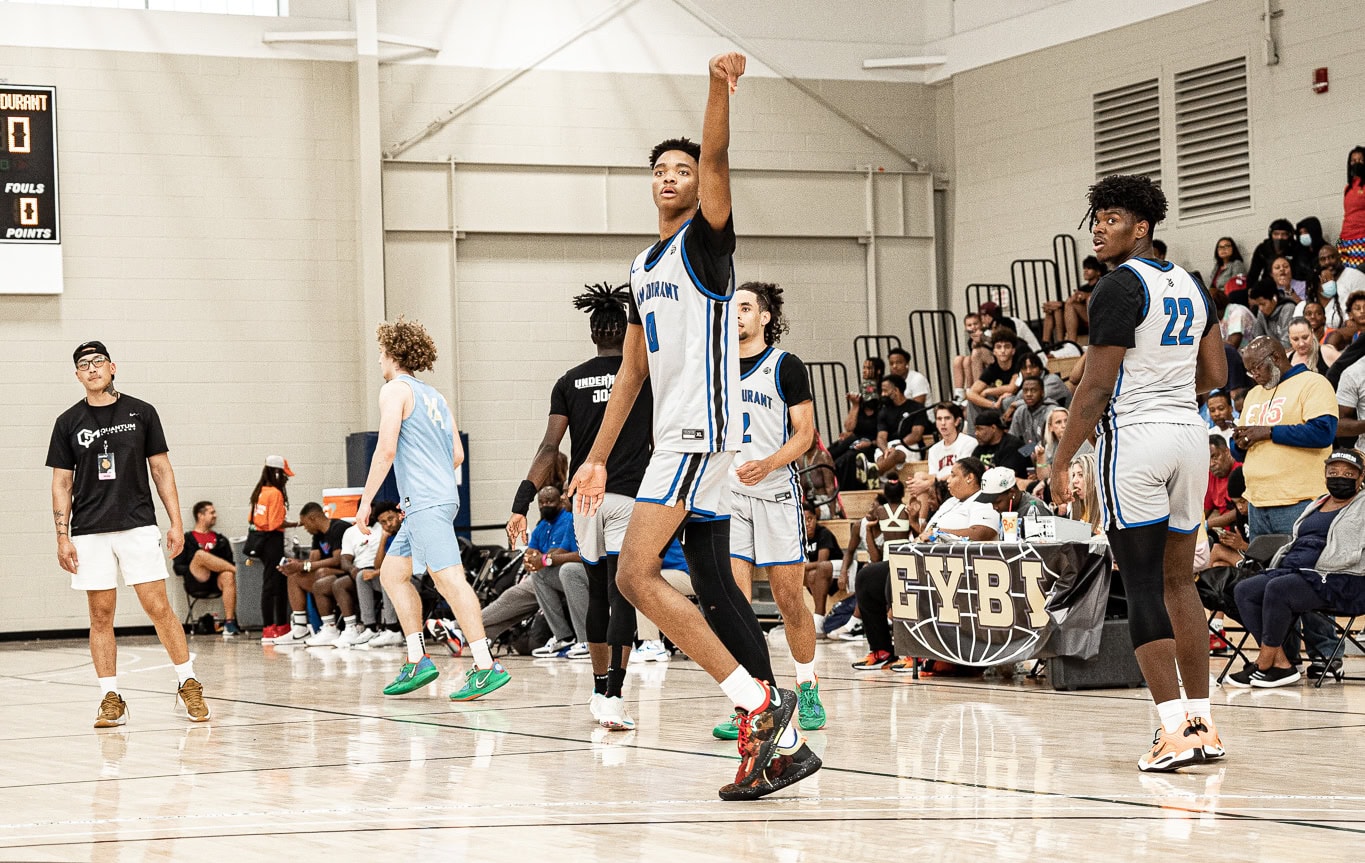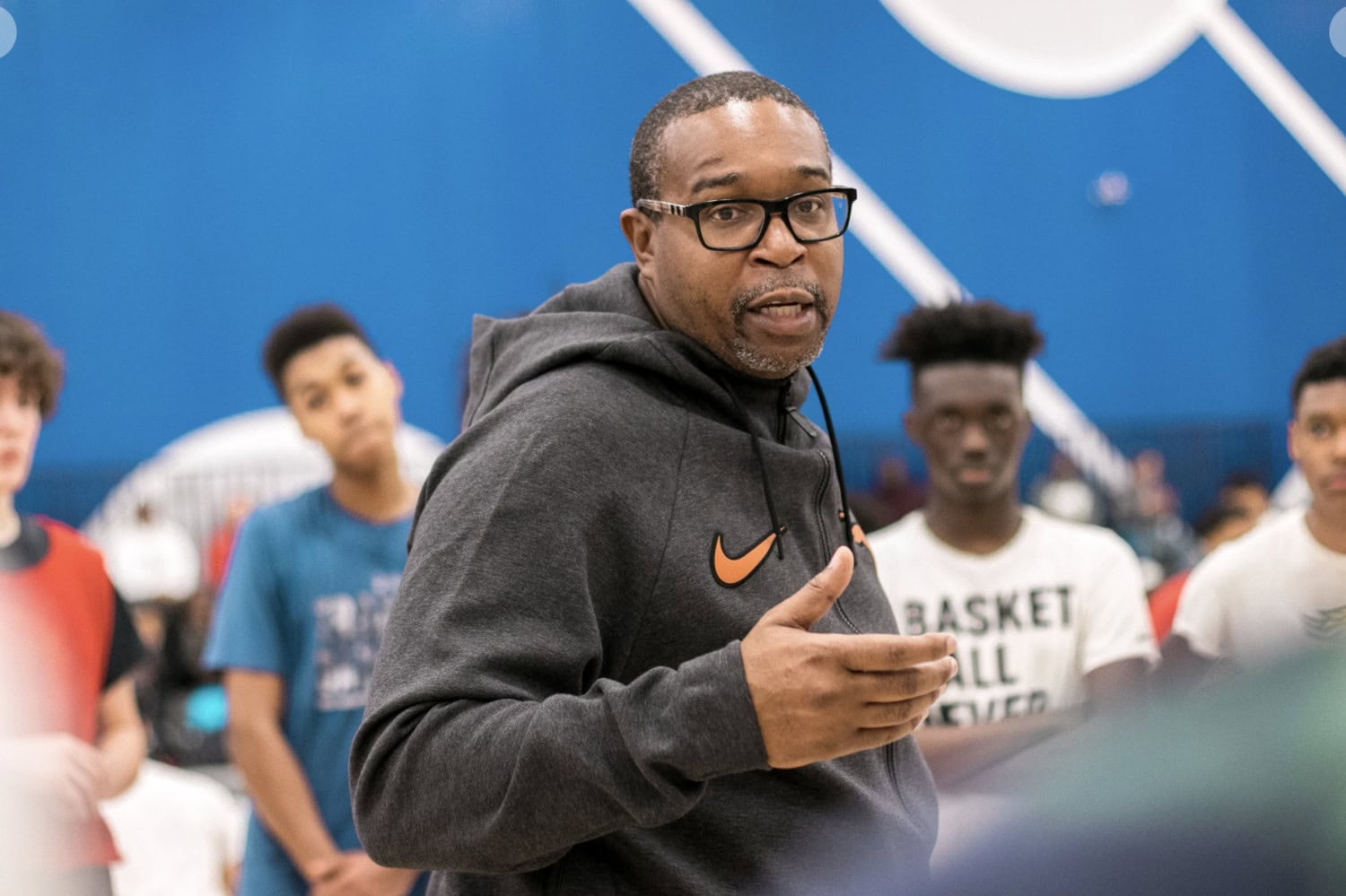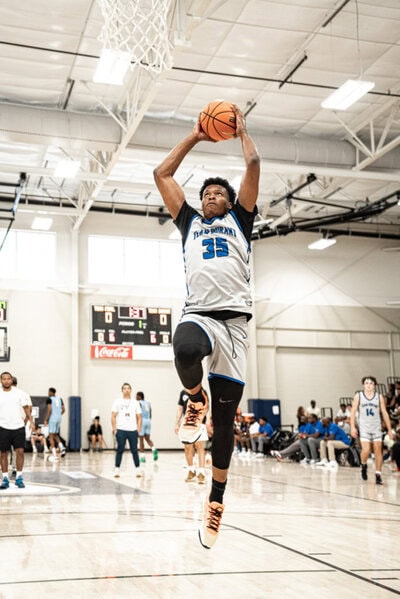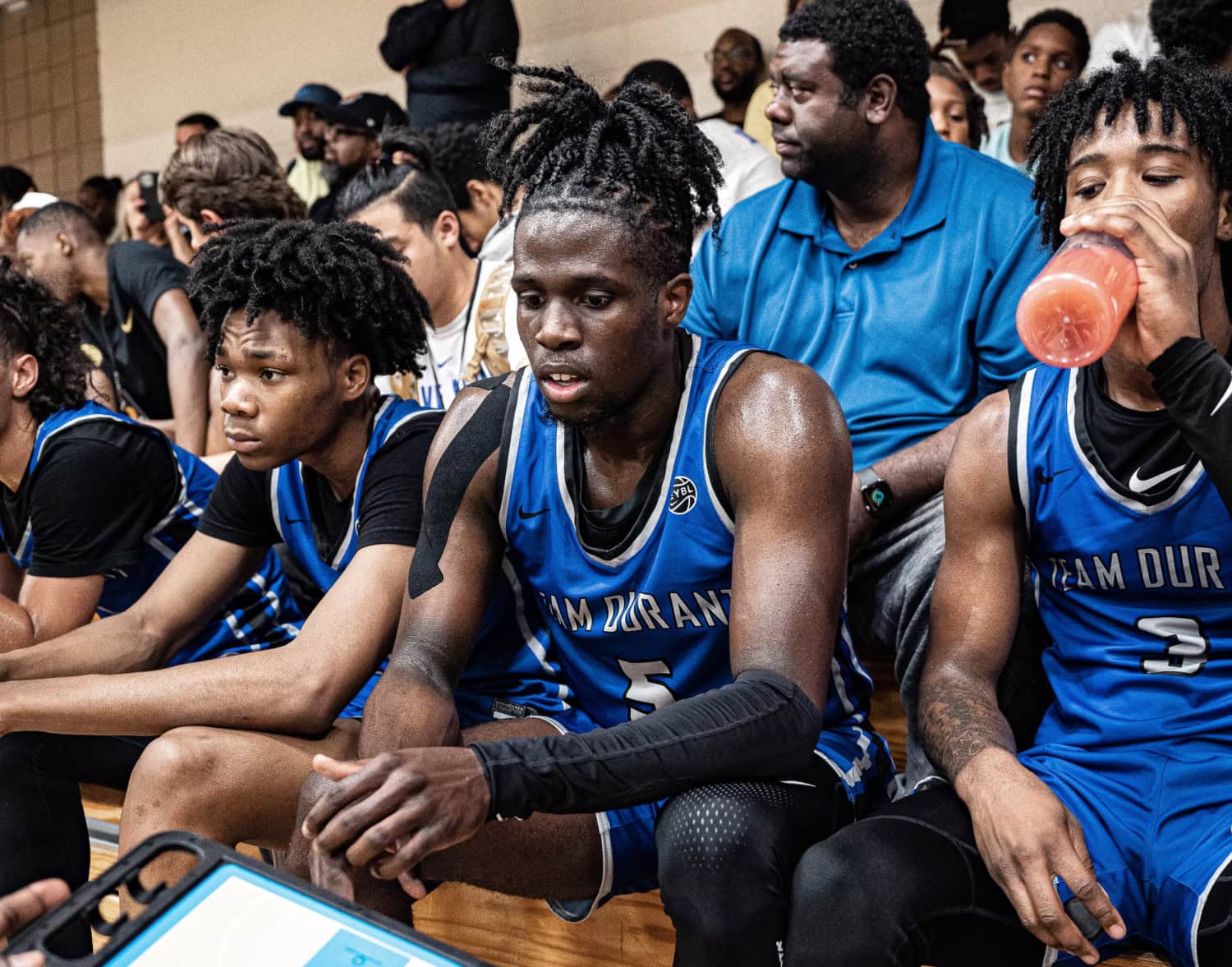Boardroom goes inside Team Durant’s ride through Nike’s Elite Youth Basketball League circuit as the 17U team prepares for life after high school.
There’s no one moment when Jahnathan Lamothe went from overlooked high school talent to bona fide Power 5 prospect, but his actions during the height of the COVID-19 pandemic were the catalyst.
That summer, while many threw exercise and nutrition by the wayside, he was in constant communication with his coaches at Team Durant, his summer grassroots club.
Wayne Pratt, director of Team Durant and Kevin Durant’s father, was on his phone, guiding players like Lamothe through workouts and keeping them motivated from afar. When Lamothe was able to work out with his high school coaches in person, he did just that, not even knowing if he’d have a 2020-21 season at all.
Lamothe’s goal was simply to come out of quarantine a different player than he was going in.
As he improved his conditioning over those months, his speed and decision-making on the court made leaps as well. Lamothe was always a good shooter, but now he could do more. He could get his teammates involved. He was defining who he would ultimately become as a player: a combo guard that could score or distribute and was as tough and strong as they come.
Fast-forward two years and Lamothe has committed to Maryland as a 4-star college prospect out of Baltimore.
Ask Pratt about his players – particularly ones like Lamothe who have been in the program for years – and he starts to get emotional. In fact, he couldn’t mask his pride when speaking to Boardroom this summer at Peach Jam, Nike’s summer championship.
“He’s one of the hardest working kids I’ve ever known,” Pratt said of Lamothe. “He’s made no excuses. He’s one of those kids that I’m just excited and happy to see what his future’s gonna be.”
He’s an undoubted Team Durant success story, but far from the only one. Since Durant and Pratt started the team, they’ve sent dozens of players to college, recruiting and developing talent for all levels of Division I. But as Pratt has told Boardroom before, the program is not just about manufacturing college basketball players; it’s about getting kids into college, preferably with a free ride and with basketball as the driving force.
To do that, Team Durant puts its players through the toughest, most competitive grassroots basketball circuit. It puts them in front of college coaches, lets them travel the country, and forces them to hone their craft through both success and failure.
That’s why Team Durant plays EYBL.
The Elite Youth Basketball League
Nike’s Elite Youth Basketball League, within which Team Durant competes, was founded in 2010 to bring together the best Nike-sponsored teams in the country for a summer of competition in front of college coaches during the NCAA’s permitted evaluation periods.
EYBL’s list of alumni reads like a who’s-who of recent NBA All-Stars: Jayson Tatum, Anthony Davis, Tyler Herro, Trae Young, De’Aaron Fox, and the list goes on.
The NBA’s older guard — specifically Durant, Chris Paul, and Carmelo Anthony — came along too late to play EYBL. All the same, they have found a way to give back, with each sponsoring a current team on the circuit.
Each season, programs in the 40-team league spend four weeks traveling to sessions across the country at which they face other EYBL teams, cramming five or six games into four days at a time. At least two of those sessions each year coincide with evaluation periods, meaning that every time a team takes the court, the biggest names in college basketball are watching them.
For Team Durant, which was led this summer by consensus 5-star recruit Kwame “KJ” Evans, this meant that John Calipari (Kentucky), Bruce Pearl (Auburn), and Dana Altman (Oregon) were routinely courtside.

After four sessions, the best 24 teams advance to Peach Jam in North Augusta, South Carolina. There, they are divided into four pools and play a round-robin to determine who moves on to the single-elimination tournament at the end of the week. On the final day, EYBL crowns its champion and, per tradition, the winning team eats peaches out of the championship cup.
While it used to be just those 24 teams that would get to play in EYBL’s final week, Nike recently made a change, inviting all 40 to the Riverview Park Activities Center in North Augusta. The 16 left out of Peach Jam compete against each other for a consolation prize – consider it like the NIT for the EYBL. That change is critical, as it means everyone gets a chance to show off in front of coaches and scouts one last time.
Don’t look at those other 16 teams, however, and think their players can’t compete. EYBL is the toughest grassroots league in the country, far surpassing Adidas’ and Under Armour’s equivalents. In fact, out of the top nine projected picks in NBADraft.net’s most recent 2024 mock draft, seven played EYBL this season and only one played on a competing circuit.
As one Team Durant player pointed out, when he played on the Under Armour circuit, teams might have one or two future high-major college players on the roster. But when he got to EYBL, he saw entire starting fives of future power conference athletes.
Making the Team
When Kevin Durant entrusted his father, Wayne Pratt, to direct his grassroots program and help get it off the ground in 2016, he knew he had an advantage: The DMV, where Durant grew up and the program is based, is positively ripe with talent.
And Pratt, as a former high school coach, knew all the power players in the DC metropolitan area. Recruiting a region with so many competing grassroots teams, including EYBL powerhouse Team Takeover, would be difficult. But it also meant Team Durant could realistically aspire to greatness.
“What Kevin wanted was to provide an opportunity for the kids in the DMV area to have a platform where they could show off their skillset in front of colleges and have an opportunity to go play Division I basketball,” Pratt said.

Having Durant’s name on the program certainly helped the organization gain admission to EYBL. Durant is, after all, one of Nike’s premiere NBA athletes. But it’s not as easy as just showing up to the first session of the summer and taking the court. The 40 EYBL teams are an exclusive group, and turnover is rare. Programs like BABC in Boston, PSA Cardinals in New York, Mac Irvin Fire in Chicago, and Team Final in Philadelphia are staples of the circuit. For a team to join them, it must prove it is committed – and not just to winning today, but to building a lasting developmental system that will benefit all age groups and prepare them for life on and off the court.
“We try to get behind programs that are all-encompassing,” said Jamal James, sports marketing manager at Nike and Manager of EYBL. “You take the vehicle of basketball and you look at certain programs and how they’re serving their communities through basketball. Athletically, but also educationally, socially, things like that.”
On the court, programs must place a priority on talent development. As James points out, hand-picking a team of all-stars might work for a year. But beyond that? That’s not how you stay in EYBL.
“The thing that I’ve told all my programs is to try to model it as if they were running a mini NBA franchise,” he said. “Obviously they don’t have the same level of resources that an NBA team would have, but you can look at it in terms of just how those infrastructures are built, serving the community, making sure there’s a developmental apparatus, having reputable coaches and things to help, because you want just a well-rounded individual — not just athletically, but just holistically.”
That was all on Pratt’s mind when he set out to build Team Durant. Yes, he could use his connections to pull some top prospects, but could he pull enough to compete right away? Could he bring in other area coaches to ensure the team is better in year two than it was in year one?
So, he started going to local high schools, scouting talent on the court and the sidelines. The conversations with prospects might remind some of how college coaches recruit; one big difference for Team Durant, however, is that joining this program is much more of a family effort. Pratt emphasizes that since the purpose of the program is to prepare kids for college, it’s just as important that the parents are willing to learn and grow along with the player.
“We recruit the parents more than we recruit the kids,” Pratt said. “I think it’s respectful to recruit the parent, then recruit the kid because we want to empower them. I was a parent who went through the process with my kids, had three kids go to college, and I wanted to be respected. So we want to do the same thing.”
Development
The 2023 power forward Amani Hansberry started playing for Pratt when he was in sixth grade, and until this summer, was not seen as a top-tier college prospect.
That changed as he hit the EYBL circuit this year, particularly in the final regular season session in Kansas City in which he looked the part of one of the most college-ready players on the floor. After carrying that same momentum into Peach Jam, the offers began pouring in. He already had a few high major offers, but then came calls from programs like Oregon, West Virginia, Tennessee, and NC State.
The coolest part? Hansberry’s ascension on the circuit came with his parents, Angela and Paul Hansberry, following him from the stands the entire way. They were there in North August, beaming with pride when he hit a buzzer-beater on the tournament’s second day to move Team Durant to 2-0 in pool play.
“He’s consistent and he’s unselfish,” Angela Hansberry said. “That’s what we admire most about him. He’s just an unselfish player who likes to go out there and work hard for his team. Those boys play for each other.”
Angela would know as well as anybody – since Amani entered Team Durant at the 12U level, she’s watched him and his teammates mature and grow closer. It’s all happened under Pratt’s eye, and she does not think that’s a coincidence. She says the coach treats his players like they are his own children.
“It’s kind of emotional to me because I’ve watched him transform his body, his attention to detail, how hard he works,” Pratt said. “And I’m so proud of him and he does it without an ego, and to me, he embodies what we are at Team Durant. I watched all the work he put in when everybody else counted him out, didn’t rank him high. And you’re seeing the results of who he is.”
The admiration is mutual. Paul Hansberry relayed that his son made it a point to watch a practice at every college visit he went on in order to see how they ran and get a feel for the energy. He wants to see himself playing within the team and eventually evolving as a leader.
That comes straight from Pratt.
“[Pratt] is the only guy, the only coach I’ve had that’s ever let me show everything I can do,” Amani Hansberry said. “I can put a ball on the floor. I shoot it real well. I’m a leader. He allows me to lead. Now that I know I grow under that tough love, it’s what I look for in a coach going to the next level.”
The Next Level
What Hansberry sees in Pratt he clearly sees in Illinois head coach Brad Underwood, as he announced his commitment to the Fighting Illini in August.
Underwood’s teams have advanced in each of the last two NCAA Tournaments, were a No. 1 seed in 2020-21, and have finished in the top four in the Big Ten each of the last three years. Hansberry will head to Urbana-Champaign next year as he looks to help the Illinois program build on its current momentum.
And following Hansberry at Illinois and Lamothe at Maryland, KJ Evans has committed to Oregon.
Pratt sees them all as the exact types of athletes Team Durant wants to produce.

“KJ embodies what we want from a player,” Pratt said. “He’s selfless. He’s one of the top players in the country, but you wouldn’t see that with his attitude. His attitude is, ‘I wanna do whatever I need to do to help our team win.’”
Nearly everybody who plays EYBL is going to play Division I basketball, and most will suit up for a high-major program, so the stars of Team Durant aren’t strictly unique in this way. They’re also not the first group of Durant disciples to commit to schools that could soon be playing in the Final Four.
Take, for example, Dariq Whitehead. The No. 2 ranked player in the class of 2022 according to ESPN, he is currently enrolled at Duke, set to lead the Blue Devils under first-year head coach Jon Scheyer.
He and Evans give Team Durant back-to-back 5-star college prospects, which is something you usually only see from the most established programs on the circuit. But from an outsider’s perspective, it’s no surprise that the team has been able to compete at the top of the EYBL despite being relatively new.
“There’s a level of professionalism that [Pratt and 17U head coach Osman Bangura] exude,” James said. “I think you can attribute a lot of [the success they’ve had] to the zeal that both of those guys have had in terms of just how they’ve gone about managing a lot of those young people who’ve been in that program, and just the standard that they’ve set.”
A Program-wide Philosophy
Just about any EYBL program will preach the same handful of principles: leadership, discipline, work ethic, accountability… take your pick.
Team Durant’s 17U head coach knows that in this specific program – one tied directly to an NBA superstar – all that needs to be more than just talk.
“With Kevin’s name being on it, he carries himself a certain way,” Bangura said. “We want to model that. We’ll represent him. We’ll represent our community. We’ll represent our family. The right way.”
He went a step further: “I think the word coach gets thrown around,” he said. “I consider myself more of a teacher.”
From the player’s perspective, the responsibility and opportunity that come with wearing the DURANT name across their chests is not lost on them.
“He’s a winner, he’s a competitor, and we can’t let him down,” Lamothe said of KD. “He does a lot for us. He always has us in the gear, all these nice hotels, everything.”

Bangura isn’t one to yell and scream on the sideline. Some coaches in EYBL can make a show out of it, serenading officials with words that start with F, S, and everything in between. They can get in their players’ faces or feed off the boos from the crowd after a bad call.
Bangura shows emotion, sure, but he never makes the game about himself. He knows his players too well to resort to those sideline theatrics. He hopes to reach each one individually, and as a group, he can help steer them in the right direction.
After a loss, Bangura doesn’t yell the paint off the walls. The meetings are long and sometimes pointed, but every player knows their job and what to do moving forward. Bangura trusts Team Durant’s athletes to execute.
And Pratt is there to make sure that accountability extends beyond the players.
Pratt coaches the 16U team and, one day this summer after a particularly painful loss, he made sure everyone stayed accountable. It was right around midday as his staff filed into a van amid the sweltering Kansas City heat and, before they could even start the engine, Pratt got out. He told everyone else to as well.
They were walking back to the team hotel.
When Pratt spoke to Boardroom in 2021, he mentioned that there are no grassroots coaches in the Hall of Fame. No one remembers who won individual games, and no one has a clue which coach has the best all-time record. Yes, Team Durant wants to win and they do it often, but Pratt says he wants to teach the game the right way. Eventually, the wins will come — even if they did not that day in Kansas City.
Later that same afternoon, he stalked the hallways of the team hotel, caught in a mixture of emotions he could only conjure by the conflict of being frustrated by the job he loves.
Asked how he was doing, he smiled.
“The game humbles you. That’s what I love about it,” he said.
Read More:
- Microsoft Gambles Big With $1.5B Investment in Foreign AI Firm
- The Jordan Luka 3: A Design Driven by Dončić
- Andre Ward is Still Writing His Story
- Chet Holmgren Has Been Studying the Sneaker Game for Years
- Learning on the Fly: How Chet Holmgren is Spreading His Wings in OKC